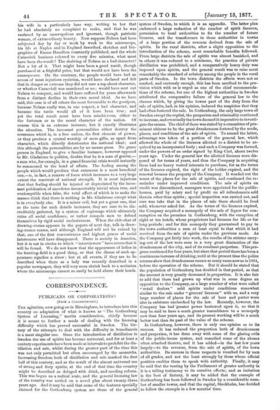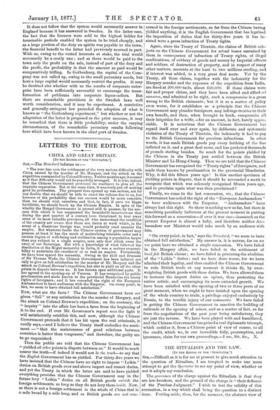CORRESPONDENCE.
PUBLICANS OR CORPORATIONS?
[FBOIt A CORRESPONDENT.] THE agitation, now going on in Birmingham, to introduce into this country an adaptation of what is known as " The Gothenburg System of Licensing," merits consideration, chiefly because it is meant to further a mode of dealing with the licensing difficulty which has proved successful in Sweden. The his- tory of the attempts to deal with the difficulty in Scandinavia is a most singular one. Since the introduction of distillation in Sweden the use of spirits has become universal, and for at least a century experiments have been made at intervals to prohibit the dis- tillation and sale, whilst during the greater part of the time this was not only permitted but often encouraged by the monarchs. Increasing freedom both of distillation and sale marked the first half of this century, and as the result of the almost universal use of strong and fiery spirits, at the end of that time the country might be described as deluged with drink, and needing reform. This was begun on a radical scale, and the general licensing law of the country was settled on a novel plan about twenty-three years ago. And it may be said that some of the features specially claimed for the Gothenburg system are those of the general system of Sweden, to which it is an appendix. The latter plan embraced a large reduction of the number of spirit licences, permission to local authorities to fix the number of future licences, and the transference to these authorities in towns of a large portion of the revenue derived from the sale of spirits. In the rural districts, after a slight opposition to the introduction of the scheme, most remarkable benefits followed. From large districts the sale of spirits was almost banished, and in others it was reduced to a minimum, the practice of private distillation was prohibited, and a comparatively heavy duty was imposed upon spirits, and the general result was to raise most remarkably the standard of sobriety among the people in the rural parts of Sweden. In the town districts the effects were not so marked, and curiously enough, this has been ascribed to the pro- vision which with us is urged as one of the chief recommenda- tions of the scheme, for one of the highest authorities in Sweden attributed the comparative failure of the general law to the clauses which, by giving the towns part of the duty from the sale of spirits, had, in his opinion, induced the suspicion that they had often fostered the sale. In Gothenburg, the only large town of Sweden except the capital, the pauperism and criminality continued to increase, and eventually the town deemed it imperative to investi- gate the causes. The chief of these was stated by a committee of pro- minent citizens to be the great drunkenness fostered by the mode, places, and conditions of the sale of spirits. To amend the latter, advantage was taken of a portion of the general law, which allowed the whole of the licences allotted to a district to be ac- quired by an incorporated body ; and such a Company was formed, under the powers of an order signed by King Carl, about twelve years ago. Under the general law the allotted licences were dis- posed of for terms of years, and thus the Company in acquiring these had no heavy vested interests to purchase, for as the terms of the licences expired, the right of the holder expired, and the renewal became the property of the Company. It weeded out the worst of the places for the sale of spirits, and continued the re- mainder under improved conditions. The sale of spirits on credit was discontinued, managers were appointed for the public- houses, paid by salary and by profit on all refreshments sold therein other than spirits ; special inspection was carried out, and care was take that in the places of sale there should be food sold, whenever asked for. As the terms of the licences expired, the Company acquired a monopoly of the sale of liquor for con- sumption on the premises in Gothenburg, with the exception of eight or ten hotels, whose proprietors had licences for life or for long periods ; and for this monopoly they guaranteed to pay to the town authorities a sum at least equal to that which it had received from the sale of spirits under the previous mode. As the Company got fairly into work, the results of its stricter carry- ing-out of the law were seen in a very great diminution of the drunkenness of the city, and of its resultant pauperism. This pro- gress continued for four years, but since that period there has been a continuous increase of drinking, until at the present time the police returns show that drunkenness causes as many cases nowas in 1864, before the operation of the scheme. But it should be stated that the population of Gothenburg has doubled in that period, so that the amount is very greatly decreased in proportion. It is also fair to add that there had grown up what was in some degree an opposition to the Company, as a large number of what were called " retail dealers" sold spirits under conditions somewhat similar to the sale under "grocers' licences" with us, and a very large number of places for the sale of beer and porter were also in existence unchecked by the law. Recently, however, the Company has had 'greater power bestowed upon it, so that it may be said to have a much greater resemblance to a monopoly now than four years ago, and its present working will be a much better test than its past of the value of the scheme.
In Gothenburg, however, there is only one opinion as to its success. It has reduced the proportion both of drunkenness and pauperism, it has done away with some of the glaring evils of the public-house system, and remedied some of the abuses often attached thereto, and it has added—in the last few years largely—to the revenue, from the sale of spirits, of the town authorities. Its success in these respects is vouched for by men of all grades, and not the least strongly by those whose official position enables them to speak with authority. Finally, it may be said that the vesting by the Parliament of greater authority in it is a telling testimony to its curative effects; and as imitation is the best of flattery, it may be added that the example of Gothenburg has been followed in Sweden by a considerable num- ber of smaller towns, and that the capital, Stockholm, has decided to follow the example in a few months' time.
It does not follow that the system would necessarily answer in England because it has answered in Sweden. In the latter case, the fact that the licences were sold to the highest bidder for terminable periods enabled the system to be tried cheaply, and as a large portion of the duty on spirits was payable to the town, the financial benefit to the latter had previously accrued in part. With us, owing to the vested interests at stake, the trial would necessarily be a costly one ; and as there would be paid to the town only the profit on the sale, instead of part of the duty and the profit, the probability is that the amount so paid would be comparatively trifling. In Gothenburg, the capital of the Com- pany was not called up, owing to the small pecuniary needs, but here a large capital would necessarily restrict the profits. It may be doubted also whether with us the results of corporate enter- prise have been sufficiently successful to encourage the trans- formation of publicans into corporate liquor-sellers. But there are remarkable provisions in the Swedish laws well worth consideration, and it may be experiment. A restrictive and generally-stringent law preceded the adoption of what is known as " the Gothenburg experiment," but whether or not the adaptation of the latter is proposed as the prior measure, it may be remarked that there is little probability, under the varying circumstances, of the remarkable pecuniary results following here which have been known in the chief port of Sweden.







































 Previous page
Previous page